2015年北京高考英语试题及答案解析
- 格式:doc
- 大小:38.22 KB
- 文档页数:20
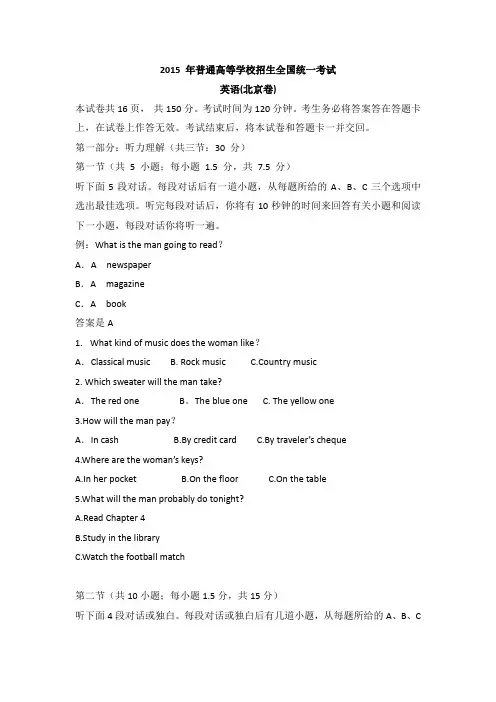
2015 年普通高等学校招生全国统一考试英语(北京卷)本试卷共16页,共150分。
考试时间为120分钟。
考生务必将答案答在答题卡上,在试卷上作答无效。
考试结束后,将本试卷和答题卡一并交回。
第一部分:听力理解(共三节:30 分)第一节(共5 小题;每小题 1.5 分,共7.5 分)听下面5段对话。
每段对话后有一道小题,从每题所给的A、B、C三个选项中选出最佳选项。
听完每段对话后,你将有10秒钟的时间来回答有关小题和阅读下一小题,每段对话你将听一遍。
例:What is the man going to read?A.A newspaperB.A magazineC.A book答案是A1.What kind of music does the woman like?A.Classical music B. Rock music C.Country music2. Which sweater will the man take?A.The red one B。
The blue one C. The yellow one3.How will the man pay?A.In cash B.By credit card C.By traveler’s cheque4.Where are the woman’s keys?A.In her pocketB.On the floorC.On the table5.What will the man probably do tonight?A.Read Chapter 4B.Study in the libraryC.Watch the football match第二节(共10小题;每小题1.5分,共15分)听下面4段对话或独白。
每段对话或独白后有几道小题,从每题所给的A、B、C三个选项中选出最佳选项。
听每段对话或独白前,你将有5秒钟的时间阅读每小题。
听完后,每小题将给出5秒钟的作答时间。
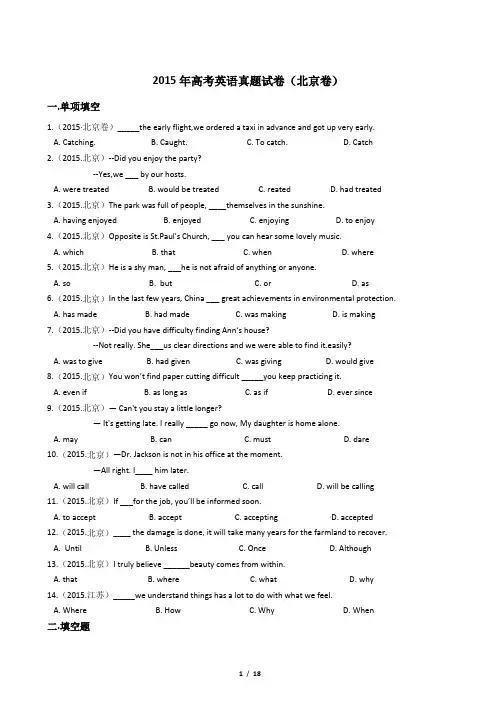
2015年高考英语真题试卷(北京卷)一.单项填空1.(2015·北京卷)_____the early flight,we ordered a taxi in advance and got up very early.A. Catching.B. Caught.C. To catch.D. Catch2.(2015.北京)--Did you enjoy the party?--Yes,we ___ by our hosts.A. were treatedB. would be treatedC. reatedD. had treated3.(2015.北京)The park was full of people, ____themselves in the sunshine.A. having enjoyedB. enjoyedC. enjoyingD. to enjoy4.(2015.北京)Opposite is St.Paul's Church, ___ you can hear some lovely music.A. whichB. thatC. whenD. where5.(2015.北京)He is a shy man, ___he is not afraid of anything or anyone.A. soB. butC. orD. as6.(2015.北京)In the last few years, China ___ great achievements in environmental protection.A. has madeB. had madeC. was makingD. is making7.(2015.北京)--Did you have difficulty finding An n‘s house?--Not really. She___us clear directions and we were able to find it.easily?A. was to giveB. had givenC. was givingD. would give8.(2015.北京)You won’t find paper cutting difficult _____you keep practicing it.A. even ifB. as long asC. as ifD. ever since9.(2015.北京)— Can't you stay a little longer?— It's getting late. I really _____ go now, My daughter is home alone.A. mayB. canC. mustD. dare10.(2015.北京)—Dr. Jackson is not in his office at the moment.—All right. I____ him later.A. will callB. have calledC. callD. will be calling11.(2015.北京)If ___for the job, you’ll be informed soon.A. to acceptB. acceptC. acceptingD. accepted12.(2015.北京)____ the damage is done, it will take many years for the farmland to recover.A. UntilB. UnlessC. OnceD. Although13.(2015.北京)I truly believe ______beauty comes from within.A. thatB. whereC. whatD. why14.(2015.江苏)_____we understand things has a lot to do with what we feel.A. WhereB. HowC. WhyD. When二.填空题15.(2015·北京)A Welcome GiftDario and his mother loved their new apartment. The living room was large enough for their piano. That night, the two of them 1 side by side at the piano. They played jazz music to celebrate their new home. The loud 2 filled the room and made them feel very happy.The next morning, 3 , their happiness disappeared. Someone had left a 4 under their door during the night. One of their neighbor had written to complain(抱怨) about the sound of the piano. Dario’s mother asked the building superintendent(管理员) if he knew anything about it. But he said that they were all 5 people and he couldn’t imagine any of them had done that. Later that morning, Dario suggested that they write a letter to their 6 and apologize for their playing.“Maybe we could go and7 everyone in person.” his mother said.“W hat if we invited them to come here for a 8 instead? Dario asked.They both loved the 9 . Over the next few days, they sent out invitations and prepared desserts 10 their guests. They decorated the apartment with streamers(彩带) and party lights.Finally, the day of the party 11 . Some guests brought presents. Others brought flowers. Some even brought desserts to 12 . One woman, Mrs. Gilbert, 13 Dario’s mother with a book of piano music by Chopin.“I heard you playing the other night,” she said. “The sounds woke me out of bed. I14 that you might play like this every night. So I wrote a short note. I hope you don’t think I disliked the playing.”Dario's mother smiled at Mrs. Gilbert. “I think maybe we15 you an apology.” she said. “I didn’t16 how late it was when we were playing. Maybe we should play some quieter music at night.“You play, you play!” Mrs. Gilbert said. “I like what you play! Just not so loud at night.”She pointed to the book she had given them. “These songs are not such17 music.”“These songs are beautiful music.” Dario’s mother said. “We will be18 to play them in the evening.”“And we won’t play so loud or late!” Dario said. He was already looking forward to19 the new music. More than that, however, he was happy to see the big smile on his mother’s face. It gave him a feeling of 20 and made him feel that they were home at last.1. A. sat B. stood C. lay D. walked2. A. voice B. ring C. music D. cry3. A. therefore B. however C. otherwise D. instead4. A. note B. poster C. bill D. report5. A. proud B. rich C. lucky D. nice6. A. neighbors B. friends C. relatives D. audience7. A. blame B. instruct C. question D. visit8. A. party B.concertC. concertD. concertE. concert9. A. experience B. idea C. performance D. action10. A. to B. with C. for D. from11. A. continued B. arrived C. passed D. finished12. A. order B. sell C. share D. advertise13. A. treated B. presented C. helped D. served14. A. promised B. admitted C. agreed D. worried15. A. give B. send C. offer D. owe16. A. realize B. remember C. understand D. accept17. A. sweet B. strange C. funny D. loud18. A. brave B. sorry C. happy D. afraid19. A. changing B. practicing C. recording D. writing20. A. equality B. freedom C. warmth D. sympathy16.(2015·北京卷)AThe Boy Made It!One Sunday, Nicholas, a teenager, went skiing at Sugarloaf Mountain in Maine. In the early afternoon, when he was planning to go home, a fierce snowstorm swept into the area. Unable to see far, he accidentally turned off the path. Before he knew it, Nicholas was lost, all alone! He didn’t have food, water, a phone, or other supplies. He was getting colder by the minute.Nicholas had no idea where he was. He tried not to panic. He thought about all the survival shows he had watched on TV.It was time to put the tips he had learned to use.He decided to stop skiing. There was a better chance of someone finding him if he stayed put. The first thing he did was to find shelter form the freezing wind and snow. If he didn’t, his body temperature would get very low, which could quickly kill him. Using his skis, Nicholas built a snow cave. He gathered a huge mass of snow and dug out a hole in the middle. Then he piled branches ontop of himself, like a blanket, to stay as warm as he could.By that evening, Nicholas was really hungry. He ate snow and drank water from a nearby stream so that his body wouldn’t lose too m uch water. Not knowing how much longer he could last, Nicholas did the only thing he could- he huddled(蜷缩) in his cave and slept.The next day, Nicholas went out to look for help, but he couldn’t find anyone. He followed his tracks and returned to the snow cave,becausewithout shelter, he could die that night. On Tuesday, Nicholas went out to find help. He had walked for about a mile when a volunteersearcher found him. After two days stuck in the snow, Nicholas was saved.Nicholas mightnot have survived this snowstorm had it not been for TV. He had often watchedGrylls’ survival show. Man vs. Wild. That's where he learned the tips that saved his life, In each episode(一期节目)of Man vs. Wild, Grylls is abandoned in a wild area and has to find his way out.When Grylls heard about Nicholas’ amazing deeds, he was super impressed that Nicholas had made it since he knew better than anyone how hard Nicholas had to work to stay alive.(1)What happened to Nicholas one Sunday afternoon?A.He got lostB.He broke his skis.C.He hurt his eyesD.He caught a cold(2)How did Nicholas keep himself warm?A.He found a shelter.B.He lighted some branches.C.He kept on skiing.D.He built a snow cave.(3)On Tuesday, Nicholas _____.A.returned to his shelter safelyB.was saved by a searcherC.got stuck in the snowD.staved where he was(4)Nicholas left Grylls a very deep impression because he _____.A.did the right things in the dangerous situationB. watched Grylls TV program regularlyC. created some tips for survivalD.was very hard-working17.(2015·北京卷)Revolutionary TV EarsTV Ears has helped thousands of people with various degrees of hearing loss hear the television clearly without turning up the volume(音量) and now it’s better and more affordable than ever! With TV Ears wireless technology, you set your own headset volume, while other TV listeners hear the television at a volume level that’s comfortable for them. You can even listen through the headset only and put the TV on mute(静音) if the situation calls for a quiet environment —maybe the baby is sleeping. Or perhaps you are the only one who is interested in listening to the TV Ears patent ed technology includes a revolutionary noise reduction car tip, not used in any other commercially available headset. This tip reduces outside noise so that television dialogue is clear and understandable. Get the technology that has proven to help the most demanding customers. That's why TV Earshas earned the trust and confidence of audiologists(听觉学家) nationwide as well as world-famous doctors.Risk Free Trial! TV Ears comes with a 30-day risk free trial.Special Offer — Now $59.95.If you’re not satisfied, return it.Money-back guarantee!Call now ! 800-123-7832(1)TV Ears helps you _____.A.improve your sleeping qualityB.listen to TV without disturbing othersC.change TV channels without difficultyD.become interested in ballgame programs(2)What makes TV Ears different from other headsets?A. It can easily set TV on mute.B.Its headset volume is adjustable.C.It has a new noise reduction car tip.D.It applies special wireless technology.(3)This advertisement is made more believable by _____.ing recommendationsB.offering reasons for this inventionC.providing statistics.D.showing the results of experiments.18.(2015·北京卷)Transparent animals let light pass through their bodies the same way light passes through a window. These an imals typically live betweenthe surface of the ocean and a depth of about 3,300 feet—as far as most light can reach. Most of them are extre mely delicate and can bedamaged by a simple touch.Sonke Johnsen, a scientist in biology, says, “These animals live through their life alone. They nevertouch anything unless they’re eating it, or unless something is eating them.”And they are as clear as glass. How does an animal become see-through? It’s trickier than you might think.The objects around you are visible because they interact with light. Light typically travels in a straight line. B ut some materials slow andscatter(散射) light, bouncing it away from its original path. Others absorb light, stopping it dead in its tracks. Both scatterin g and absorptionmake an object look different from other objects around it, so you can see it easily.But a transparent object doesn’t absorb or scatter light, at least not very much, Light can pass through it wi thout bending or stopping.That means a transparent object doesn’t look very different from the surrounding air or water. You don’t see it ----you see the thingsbehind it.To become transparent, an animal needs to keep its body from absorbing or scattering light. Living materials c an stop light because theycontain pigments(色素) that absorb specific colors of light. But a transparent animal doesn’t have pigments, so its tissues won’t absor blight. Accordingto Johnsen, avoiding absorption is actually easy. The real challenge is preventing light from scattering.Animals are built of many different materials----skin, fat, and more----and light moves through each at a diffe rent speed. Every time lightmoves into a material with a new speed, it bends and scatters.Transparent animals use different tricks to fight sc attering. Some animals aresimply very small or extremely flat. Without much tissue toscatter light, it is easier to be see--through. Others build a large, clear mass ofnon-living jelly-lie(果冻状的)material and spread themselves over it .Larger transparent animals have the biggest challenge, because they have to make all the different tissues in their bodies slow down lightexactly as much as water does. They need to look uniform. But how th ey’re doing it is still unknown. One thing is clear for these larger animals, staying transparent is an active process. When they die, they turn a non-transpare nt milky white.(1)According to Paragraph 1, transparent animals_______A.stay in groupsB.can be easily damagedC.appear only in deep oceanD.are beautiful creatures(2)The underlined word “dead” in Paragraph 3 means__________.A.silentlyB.graduallyC.regularlypletely(3)One way for an animal to become transparent is to ________.A. change the direction of light travelB.gather materials to scatter light.C.avoid the absorption of lightD. grow bigger to stop light.(4)The last paragraph tells us that larger transparent animals________.A.move more slowly in deep waterB. stay see-through even after deathC. produce more tissues for their survivalD.take effective action to reduce Light spreading19.(2015·北京卷) DTechnological change is everywhere and affects every aspect of life, mostly for the better. However, social changes are brought about by new technology are often mistaken for a change in attitudes.An example at hand is the involvement of parents in the lives of their children who are attending college. Surveys (调查) on this topicsuggests that parents today continue to be “very” or“somewhat” overlyprotective even after their children move into collegedormitories. The same surveys also indicate that the rate of parental involvement is greater today than it wasa generation ago.This is usually interpreted as a sign that today’s parents are trying to manage their children’s lives past the point where this behavior is appropriate.However, greater parental involvement does not necessarily indicate that parents are failing to let go of their “adult” children.In the context (背景) of this discussion, it seems valuable to first find out the cause of change in the case of parents’ involveme nt withtheir grown children.If parents of earlier generations had wanted to be in touch with their college-age children frequently, would thishave been possible? Probably not. On the other hand, does the possibility of frequent communication today mean that the urge to do so wasn’t present a generation ago? Many studies show that older parents - today’s grandparents - wouldhave called their children more often if the means and cost of doing so had not been a barrier.Furthermore, studies show that finances are the most frequent subject of communication between parents and their college children. The fact that college students are financially dependent on their parents is nothing new; nor are requests for more money to be sent fromhome. This phenomenon is neither good nor bad; it is a fact of college life,today and in the past.Thanks to the advanced technology, we live in an age of bettered communication. This has many implications well beyondthe role that parents seem to play in the lives of their children who have left for college.But it is useful to bear in mind that all such changes come from the technology and not some imagined desire byparents to keep their children under their wings.(1)The surveys inform us of ______A. the development of technologyB.the changes of adult children’s behaviorC. the parents’ over-protection of their college childrenD.the means and expenses of students’ communication(2)The writer believes that ______.A.parents today are more protective than those in the pastB.the disadvantages of new technology outweigh its advantegesC.technology explains greater parental involvement with their childrenD.parents' changed attitudes lead to college children's delayed independence(3)What is the best title for the passage?A.Technology or AttitudeB. Dependence or IndependenceC.Family Influence or Social ChangesD.College Management or Communication Advancement(4)Which of the following shows the development of ideas in this passage?A.B.C.D.E.三.写作题20.(2015·北京卷)假如你是红星中学学生李华。
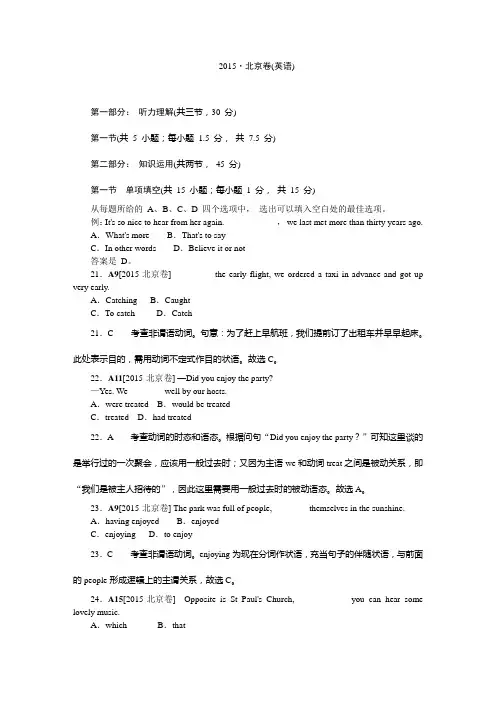
2015·北京卷(英语)第一部分:听力理解(共三节,30 分)第一节(共5 小题;每小题 1.5 分,共7.5 分)第二部分:知识运用(共两节,45 分)第一节单项填空(共15 小题;每小题 1 分,共15 分)从每题所给的A、B、C、D 四个选项中,选出可以填入空白处的最佳选项。
例:It's so nice to hear from her again. ________,we last met more than thirty years ago.A.What's more B.That's to sayC.In other words D.Believe it or not答案是D。
21.A9[2015·北京卷] ________the early flight, we ordered a taxi in advance and got up very early.A.Catching B.CaughtC.To catch D.Catch21.C 考查非谓语动词。
句意:为了赶上早航班,我们提前订了出租车并早早起床。
此处表示目的,需用动词不定式作目的状语。
故选C。
22.A11[2015·北京卷] —Did you enjoy the party?—Yes. We ________well by our hosts.A.were treated B.would be treatedC.treated D.had treated22.A 考查动词的时态和语态。
根据问句“Did you enjoy the party?”可知这里谈的是举行过的一次聚会,应该用一般过去时;又因为主语we和动词treat之间是被动关系,即“我们是被主人招待的”,因此这里需要用一般过去时的被动语态。
故选A。
23.A9[2015·北京卷] The park was full of people, ________themselves in the sunshine.A.having enjoyed B.enjoyedC.enjoying D.to enjoy23.C 考查非谓语动词。
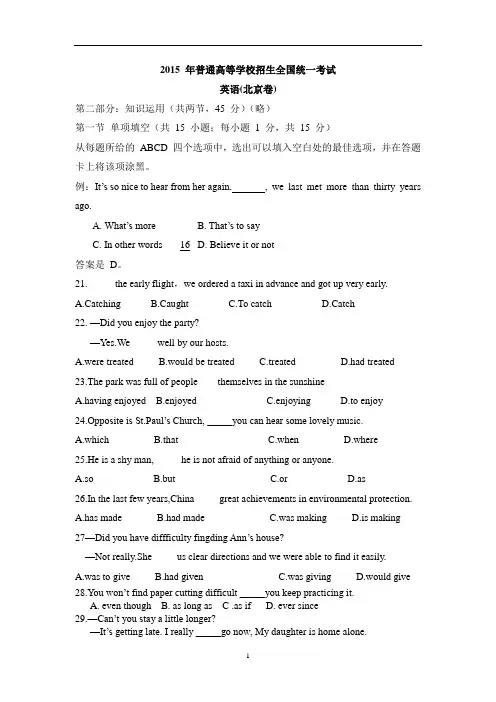
2015 年普通高等学校招生全国统一考试英语(北京卷)第二部分:知识运用(共两节,45 分)(略)第一节单项填空(共15 小题;每小题 1 分,共15 分)从每题所给的ABCD 四个选项中,选出可以填入空白处的最佳选项,并在答题卡上将该项涂黑。
例:It’s so nice to hear from her again., we last met more than thirty years ago.A. What’s moreB. That’s to sayC. In other words 16D. Believe it or not答案是D。
21. _____the early flight,we ordered a taxi in advance and got up very early.A.CatchingB.CaughtC.To catchD.Catch22. —Did you enjoy the party?—Yes.We _____well by our hosts.A.were treatedB.would be treatedC.treatedD.had treated23.The park was full of people____themselves in the sunshineA.having enjoyedB.enjoyedC.enjoyingD.to enjoy24.Opposite is St.Paul’s Church, _____you can hear some love ly music.A.whichB.thatC.whenD.where25.He is a shy man, _____he is not afraid of anything or anyone.A.soB.butC.orD.as26.In the last few years,China_____great achievements in environmental protection.A.has madeB.had madeC.was makingD.is making 27—Did you have diffficulty fingding Ann’s house?—Not really.She_____us clear directions and we were able to find it easily.A.was to giveB.had givenC.was givingD.would give28.You won’t find paper cutting difficult _____you keep practicing it.A. even thoughB. as long as C .as if D. ever since29.—Can’t you stay a little longer?—It’s getting late. I really _____go now, My daughte r is home alone.A .mayB .canC . mustD .dare30.—Dr. Jackson is not in his office at the moment.—All right. I____ him later.A. will callB. have calledC. call D will be calling31.If ___for the job, you’ll be informed soon.A .to accept B. accept C. accepting D. accepted32._____the damage is dooe, it will take many years for the farmland to recover.A.UntillB.UnlessC. OnceD.Although33.I truly believe ______beauty comes from within.A. thatB.whereC. whatD.why34.I fI _____it with my own eyes ,Iwouldn’t have believed it.A .didn’t see B.weren’t seeing C. Wouldn’t see D.hadn’t seen35._____we understand things has a lot to do with what we feel.A. WhereB.HowC.WhyD. When第二节完形填空(共20 小题;每小题 1.5 分,共30 分)阅读下面短文,掌握其大意,从每题所给的A、B、C、D 四个选项中,选出最佳选项,并在答题卡上讲该项涂黑。
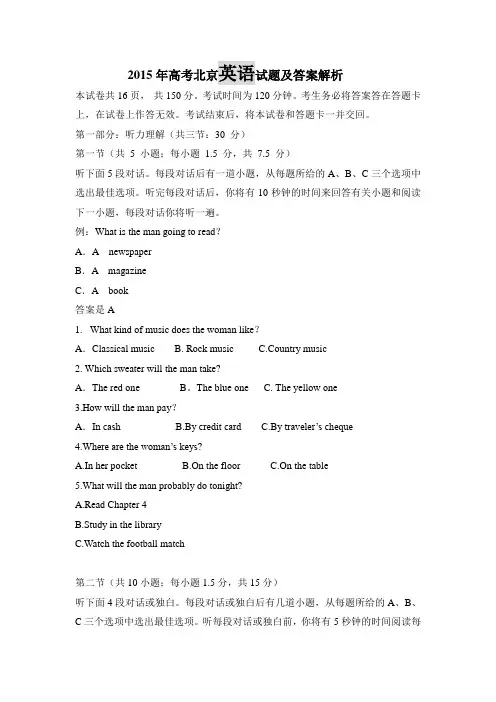
2015年高考北京英语试题及答案解析本试卷共16页,共150分。
考试时间为120分钟。
考生务必将答案答在答题卡上,在试卷上作答无效。
考试结束后,将本试卷和答题卡一并交回。
第一部分:听力理解(共三节:30 分)第一节(共5 小题;每小题 1.5 分,共7.5 分)听下面5段对话。
每段对话后有一道小题,从每题所给的A、B、C三个选项中选出最佳选项。
听完每段对话后,你将有10秒钟的时间来回答有关小题和阅读下一小题,每段对话你将听一遍。
例:What is the man going to read?A.A newspaperB.A magazineC.A book答案是A1.What kind of music does the woman like?A.Classical music B. Rock music C.Country music2. Which sweater will the man take?A.The red one B。
The blue one C. The yellow one3.How will the man pay?A.In cash B.By credit card C.By traveler’s cheque4.Where are the woman’s keys?A.In her pocketB.On the floorC.On the table5.What will the man probably do tonight?A.Read Chapter 4B.Study in the libraryC.Watch the football match第二节(共10小题;每小题1.5分,共15分)听下面4段对话或独白。
每段对话或独白后有几道小题,从每题所给的A、B、C三个选项中选出最佳选项。
听每段对话或独白前,你将有5秒钟的时间阅读每小题。
听完后,每小题将给出5秒钟的作答时间。
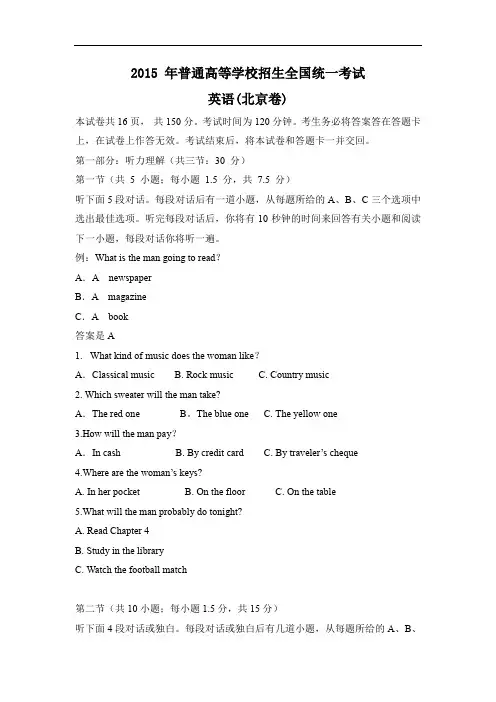
2015 年普通高等学校招生全国统一考试英语(北京卷)本试卷共16页,共150分。
考试时间为120分钟。
考生务必将答案答在答题卡上,在试卷上作答无效。
考试结束后,将本试卷和答题卡一并交回。
第一部分:听力理解(共三节:30 分)第一节(共5 小题;每小题 1.5 分,共7.5 分)听下面5段对话。
每段对话后有一道小题,从每题所给的A、B、C三个选项中选出最佳选项。
听完每段对话后,你将有10秒钟的时间来回答有关小题和阅读下一小题,每段对话你将听一遍。
例:What is the man going to read?A.A newspaperB.A magazineC.A book答案是A1.What kind of music does the woman like?A.Classical music B. Rock music C. Country music2. Which sweater will the man take?A.The red one B。
The blue one C. The yellow one3.How will the man pay?A.In cash B. By credit card C. By traveler’s cheque4.Where are the woman’s keys?A. In her pocketB. On the floorC. On the table5.What will the man probably do tonight?A. Read Chapter 4B. Study in the libraryC. Watch the football match第二节(共10小题;每小题1.5分,共15分)听下面4段对话或独白。
每段对话或独白后有几道小题,从每题所给的A、B、C三个选项中选出最佳选项。
听每段对话或独白前,你将有5秒钟的时间阅读每小题。
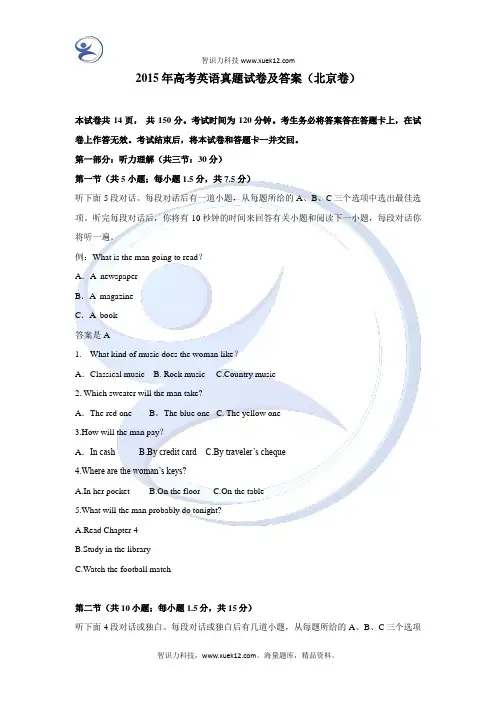
2015年高考英语真题试卷及答案(北京卷)本试卷共14页,共150分。
考试时间为120分钟。
考生务必将答案答在答题卡上,在试卷上作答无效。
考试结束后,将本试卷和答题卡一并交回。
第一部分:听力理解(共三节:30 分)第一节(共 5 小题;每小题 1.5 分,共 7.5 分)听下面5段对话。
每段对话后有一道小题,从每题所给的A、B、C三个选项中选出最佳选项。
听完每段对话后,你将有10秒钟的时间来回答有关小题和阅读下一小题,每段对话你将听一遍。
例:What is the man going to read?A.A newspaperB.A magazineC.A book答案是A1.What kind of music does the woman like?A.Classical music B. Rock music C.Country music2. Which sweater will the man take?A.The red one B。
The blue one C. The yellow one3.How will the man pay?A.In cash B.By credit card C.By traveler’s cheque4.Where are the woman’s keys?A.In her pocketB.On the floorC.On the table5.What will the man probably do tonight?A.Read Chapter 4B.Study in the libraryC.Watch the football match第二节(共10小题;每小题1.5分,共15分)听下面4段对话或独白。
每段对话或独白后有几道小题,从每题所给的A、B、C三个选项中选出最佳选项。
听每段对话或独白前,你将有5秒钟的时间阅读每小题。
听完后,每小题将给出5秒钟的作答时间。
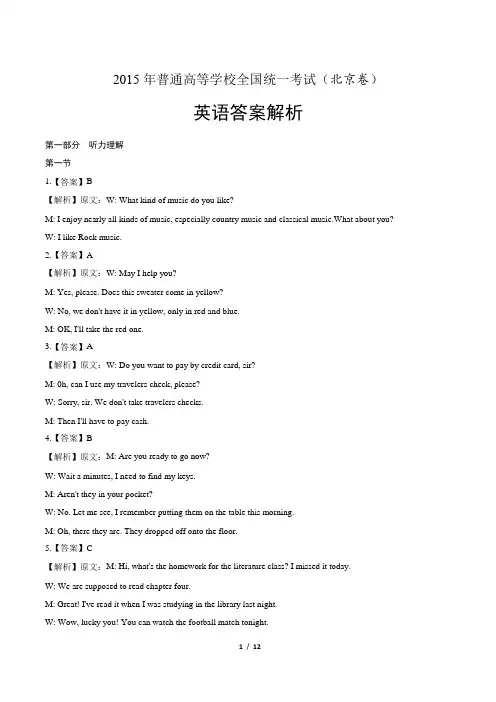
2015年普通高等学校全国统一考试(北京卷)英语答案解析第一部分听力理解第一节1.【答案】B【解析】原文:W: What kind of music do you like?M: I enjoy nearly all kinds of music, especially country music and classical music.What about you? W: I like Rock music.2.【答案】A【解析】原文:W: May I help you?M: Yes, please. Does this sweater come in yellow?W: No, we don't have it in yellow, only in red and blue.M: OK, I'll take the red one.3.【答案】A【解析】原文:W: Do you want to pay by credit card, sir?M: 0h, can I use my travelers check, please?W: Sorry, sir. We don't take travelers checks.M: Then I'll have to pay cash.4.【答案】B【解析】原文:M: Are you ready to go now?W: Wait a minutes, I need to find my keys.M: Aren't they in your pocket?W: No. Let me see, I remember putting them on the table this morning.M: Oh, there they are. They dropped off onto the floor.5.【答案】C【解析】原文:M: Hi, what's the homework for the literature class? I missed it today.W: We are supposed to read chapter four.M: Great! I've read it when I was studying in the library last night.W: Wow, lucky you! You can watch the football match tonight.M: That is right!第二节6.【答案】C7.【答案】A【解析】原文:M:What is my schedule for tomorrow,Lisa?W: Well, your flight leaves from Heathrow at 7:10 am from Terminal 2, and arrives in Frankford at 8:40 am.M: And then?W: Then you can take the shuttle bus into town.M: Oh, yes, of course. And the meetings, when do they begin?W: The meetings will start at 10:00 am, and end at 3:00 pm, with a short lunch break.Your flight back will after the meetings, you will have some time for afternoon tea leave at 5:00 pm, it gets back here at 6:30 pm.M: That is fine.Then I'll be able to have dinner with my wife.8.【答案】C9.【答案】B【解析】原文:W: May I help you?M: Yes, please. I'm a new student, and I want to borrow some books.W: Sure. What books do you want?M: Are there any biographies of George Washington?W: Let me check it for you on the computer? Oh, there are five of them.M: Can you tell me where they are?W: Of course. They are in the biography section, in row 3.M: Oh, thank you. Are there any French novels?W: Yes, I think so. They are over there in row 7.That is where our foreignlanguage section is.M: And the magazines?W: They are in row 5.M: OK, thank you. By the way, how many books can I borrow at a time?W: Two at most and you can keep them for three weeks.M: Thank you. I'll borrow two biographies today.W: OK, go in and get them.Bye for now.M: Bye.10.【答案】A11.【答案】B12.【答案】A【解析】原文:W: Hello, Sunny Sports Center. How can I help you?M: Hello. I'd like some information about your sports center.W: Well, we've got a very good gym with all the latest equipment, a swimming pool, a football ground, three basketball courts, and so on.M: Sounds great.W: Then what sports are you interested in?M: Well, I like basketball very much.W: And how often will you use the center?M: I suppose about two or three times a week.W: OK. Look, I can send you the information about the center.M: Great! One more thing, can you tell me your opening hours?W: No problem. Tuesday to Friday, 7:30 am to 10 o'clock at night. Weekends, from am to 9 pm.But we do not open on Mondays.M: I got it. Thank you, bye!W: You are welcome!13.【答案】C14.【答案】C15.【答案】B【解析】原文:Good morning,everyone!And a very warm welcome back!I hope you've enjoyed your holidays!For those of you who I knew,my name is Mary Smith,headmistress of this school.I'd like to start our new term with a few notices.First,I'd like to introduce two new teachers,Ms Woods,our new music teacher,Mr.Williams,our new French teacher.Let's give them a warm welcome.Now,I'll talk about some of the activities for this term.After school clubs,we'll start in week2.But the baseball club,we'l1 start in week4.And,there are several new clubs,too.The dance club will meet on Mondays,and the chess club,on Wednesdays.Finally,I'd like to remind you that there will be several parent's evenings during this term.Year 7,we will have one in September,Year 8,in October,and Year 9,in November.That's all I want tosay.Thank you for your attention,and enjoy your new term.第三节16. Tarshis17.62793518. May19. black20.open【解析】原文:W: Can I help you?M: Yes, please. I want to fix my cell phone.W: What's wrong?M: The screen went black last night.W: Went black?M: Yes.W: Did you have an accident? Like dropping it on the ground, or into water?M: NO.W: Well, then the repairman will help to open it up and check the inside.M: How much will it cost?W: It depends. Have you got the receipt?M: Yes. Here you are.W: OK. You bought it from us on May l st, only three weeks ago. Then it will be free to inspect it.But if the damage is caused by the user, you will have to pay for the repair.M: I see. When can I take it back?W: I'm not sure. We will give you a call as soon as it's fixed. Your name, please?M: Thomas Tarshis, hat is T-A-R-S-H-I-S.W: Your phone number?M: 627935.W: 627935. OK, that it. Anything else?M: No, thank you. Bye.W: Bye.第二部分知识运用第一节单项填空21.【答案】C【翻译】为了赶上早班飞机,我们提前叫了出租车而且起得很早。
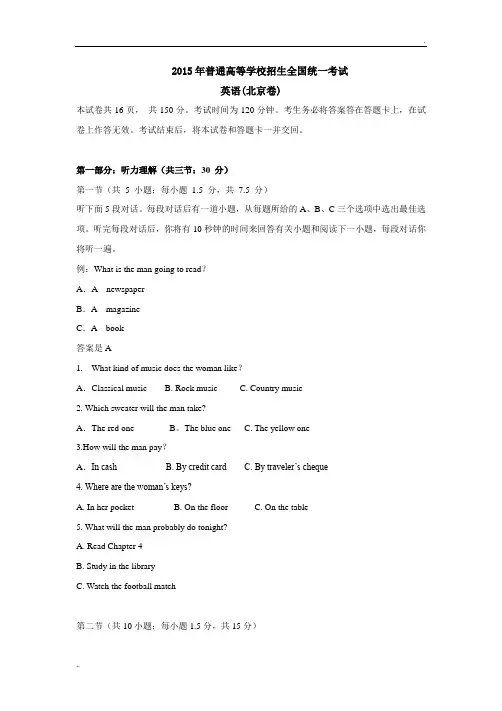
2015年普通高等学校招生全国统一考试英语(北京卷)本试卷共16页,共150分。
考试时间为120分钟。
考生务必将答案答在答题卡上,在试卷上作答无效。
考试结束后,将本试卷和答题卡一并交回。
第一部分:听力理解(共三节:30 分)第一节(共5 小题;每小题 1.5 分,共7.5 分)听下面5段对话。
每段对话后有一道小题,从每题所给的A、B、C三个选项中选出最佳选项。
听完每段对话后,你将有10秒钟的时间来回答有关小题和阅读下一小题,每段对话你将听一遍。
例:What is the man going to read?A.A newspaperB.A magazineC.A book答案是A1.What kind of music does the woman like?A.Classical music B. Rock music C. Country music2. Which sweater will the man take?A.The red one B。
The blue one C. The yellow one3.How will the man pay?A.In cash B. By credit card C. By traveler’s cheque4. Where are the woman’s keys?A. In her pocketB. On the floorC. On the table5. What will the man probably do tonight?A. Read Chapter 4B. Study in the libraryC. Watch the football match第二节(共10小题;每小题1.5分,共15分)听下面4段对话或独白。
每段对话或独白后有几道小题,从每题所给的A、B、C三个选项中选出最佳选项。
听每段对话或独白前,你将有5秒钟的时间阅读每小题。
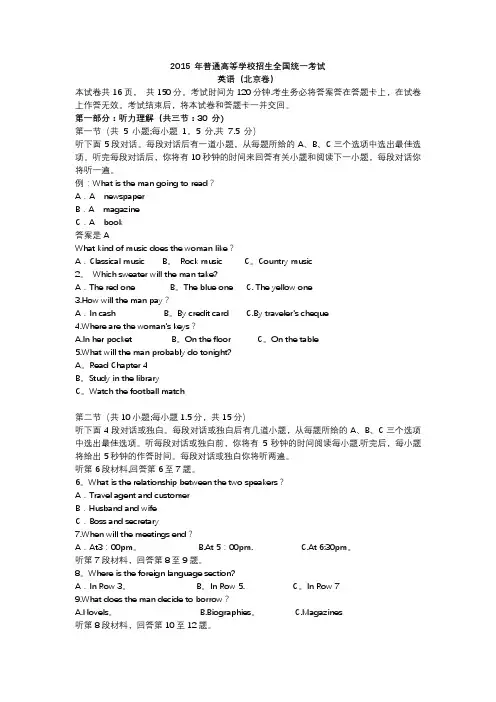
2015 年普通高等学校招生全国统一考试英语(北京卷)本试卷共16页,共150分。
考试时间为120分钟.考生务必将答案答在答题卡上,在试卷上作答无效。
考试结束后,将本试卷和答题卡一并交回。
第一部分:听力理解(共三节:30 分)第一节(共5 小题;每小题1。
5 分,共7.5 分)听下面5段对话。
每段对话后有一道小题,从每题所给的A、B、C三个选项中选出最佳选项。
听完每段对话后,你将有10秒钟的时间来回答有关小题和阅读下一小题,每段对话你将听一遍。
例:What is the man going to read?A.A newspaperB.A magazineC.A book答案是AWhat kind of music does the woman like?A.Classical music B。
Rock music C。
Country music2。
Which sweater will the man take?A.The red one B。
The blue one C. The yellow one3.How will the man pay?A.In cash B。
By credit card C.By traveler's cheque4.Where are the woman’s keys?A.In her pocket B。
On the floor C。
On the table5.What will the man probably do tonight?A。
Read Chapter 4B。
Study in the libraryC。
Watch the football match第二节(共10小题;每小题1.5分,共15分)听下面4段对话或独白。
每段对话或独白后有几道小题,从每题所给的A、B、C三个选项中选出最佳选项。
听每段对话或独白前,你将有5秒钟的时间阅读每小题.听完后,每小题将给出5秒钟的作答时间。
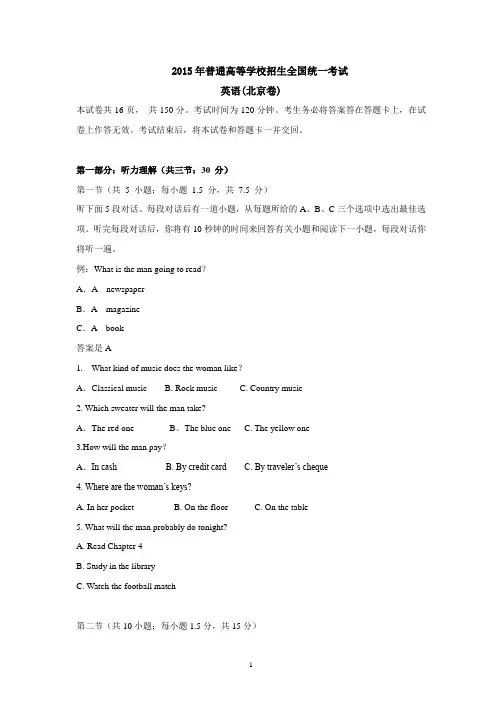
2015年普通高等学校招生全国统一考试英语(北京卷)本试卷共16页,共150分。
考试时间为120分钟。
考生务必将答案答在答题卡上,在试卷上作答无效。
考试结束后,将本试卷和答题卡一并交回。
第一部分:听力理解(共三节:30 分)第一节(共5 小题;每小题 1.5 分,共7.5 分)听下面5段对话。
每段对话后有一道小题,从每题所给的A、B、C三个选项中选出最佳选项。
听完每段对话后,你将有10秒钟的时间来回答有关小题和阅读下一小题,每段对话你将听一遍。
例:What is the man going to read?A.A newspaperB.A magazineC.A book答案是A1.What kind of music does the woman like?A.Classical music B. Rock music C. Country music2. Which sweater will the man take?A.The red one B。
The blue one C. The yellow one3.How will the man pay?A.In cash B. By credit card C. By traveler’s cheque4. Where are the woman’s keys?A. In her pocketB. On the floorC. On the table5. What will the man probably do tonight?A. Read Chapter 4B. Study in the libraryC. Watch the football match第二节(共10小题;每小题1.5分,共15分)听下面4段对话或独白。
每段对话或独白后有几道小题,从每题所给的A、B、C三个选项中选出最佳选项。
听每段对话或独白前,你将有5秒钟的时间阅读每小题。
2015年北京高考英语试题第I卷第一部分:听力理解(共三节:30 分)第一节(共5小题;每小题1.5 分,共7.5 分)第二部分:知识运用(共两节,45分)(略)第一节单项填空(共15 小题;每小题 1 分,共15分)从每题所给的ABCD四个选项中,选出可以填入空白处的最佳选项,并在答题卡上将该项涂黑。
例:It’s so niceto hear from heragain. ,we last metmore thanthirty yearsago.A. What’smoreﻩﻩB.That’s to sayC.In otherwordsﻩD. Believe it ornot答案是D。
21.______the early flight,we ordered a taxiin advance and got upvery early.A. CatchingB. Caught C.TocatchD. Catch22.----Didyou enjoythe party?----Yes.We______well by our hosts.A. Were treated B. Would betreatedC. Treated D.Had treat ed23.The parkwasfull of people,______themselves in the sunshine.A. Having enjoyedB. Enjoyed C.Enjoying D.Toenjoy24.Opposite isSt.Paul’s Church, ______you can hear some lovely music.A. WhichB. ThatC.WhenD. Where25.He is shy man, ____he isnot afraidof anythingoranyone.A. so B.but C. or D. as26.In the last fewyears,chine____ greatachievements inenvironmental protection.A. Has madeB. Had madeC. Was makingD.Ismaking27.----Did you have difficulty finding Ann’shouse?----Not really. She ____us clear directions and we wereable to find it easily.A.was to give Bhadgiven C was giving D wouldgive28.You won’t findpapercutting difficult_____you keep practicing it.A.even if B.as longas C .as if D.ever since29.—Can’t you stayalittlelonger?—It’s getting late. I really_____gonow, My daughteris homealone.A .mayB .can C. must D.dare30.—Dr. Jackson is notin his officeat themoment.—All right.I____ him later.A.will call B.have called C.call D will becalling31.If ___for the job, you’llbe informed soon.A.toaccept B.accept C. accepting D. accepted32._____thedamage is dooe, it will takemany years forthe farmland to recover.A.Untill B.Unless C.OnceD.Although33.Itrulybelieve ______beauty comes from within.A. thatB.whereC.what D.why34.If I _____it with my own eyes ,I wouldn’thavebelievedit.A.didn’t see B.weren’t seeing C.Wouldn’t see D.hadn’t seen35._____we understand thingshas a lot todo withwhat we feel.A. WhereB.How C.WhyD.When第二节完形填空(共20小题;每小题 1.5 分,共30 分)阅读下面短文, 掌握其大意,从每题所给的A、B、C、D 四个选项中,选出最佳选项,并在答题卡上讲该项涂黑。
2015年普通高等学校招生全国统一考试(北京卷)英语1. the early flight,we ordered a taxi in advance and got up very early.A. CatchingB. CaughtC. To catchD. Catch2. —Did you enjoy the party?—Yes. We ______ well by our hosts.A. were treatedB. would be treatedC. treatedD. had treated3. The park was full of people, themselves in the sunshine.A. having enjoyedB. enjoyedC. enjoyingD. to enjoy4. Opposite is St. Paul's Church, ______ you can hear some lovely music.A. whichB. thatC. whenD. where5. He is a shy man, he is not afraid of anything or anyone.A. soB. butC. orD. as6. In the last few years, China ______ great achievements in environmental protection.A. has madeB. had madeC. was makingD. is making7. ——Did you have difficulty finding Ann’s house?——Not really.She us clear directions and we were able to find it easily.A. was to giveB. had givenC. was givingD. would give8. You won’t find paper cutting difficult you keep practicing it.A. even thoughB. as long asC. as ifD. ever since9. ——Can’t you stay a little longer?——It’s getting late.I really go now.My daughter is home alone.A. mayB. canC. mustD. dare10. ——Dr. Jackson is not in his office at the moment.——All right. I ______ him later.A. will callB. have calledC. callD. will be calling11. If ______ for the job, you'll be informed soon.A. to acceptB. acceptC. acceptingD. accepted12. the damage is done,it will take many years for the farmland torecover.A. UntilB. UnlessC. OnceD.Although13. I truly believe beauty comes from within.A. thatB. whereC. whatD. why14. If I it with my own eyes,I wouldn’t have believed it.A. didn’t seeB. weren’t seeingC. wouldn’t seeD. hadn’t seen15. we understand things has a lot to do with what we feel.A. WhereB. HowC. WhyD. WhenA Welcome GiftDario and his mother loved their new apartment.The living room was large enough for their piano.That night,the two of them (16) side by side at the piano.They played jazz music to celebrate their new home.The loud (17) filled the room and made them feel very happy.The next morning, (18) ,their happiness disappeared.Someone had left a (19) under their door during the night.One of their neighbors had written to complain(抱怨) about the sound of the piano.Dario’s mother asked the building superintendent(管理员) if he knew anything about it.But he said that they were all (20) people and he couldn’t imagine any of them had done ter that morning,Dario suggested that they write a letter to their (21) and apologize for their playing.“Maybe we could go and (22) everyone in person,”his mother said.“What if we invited them to come here for a (23) instead?”Dario asked.They both loved the (24) .Over the next few days,they sent out invitations and prepared desserts (25) their guests.They decorated the apartment with streamers(彩带) and party lights.Finally,the day of the party (26) .Some guests brought presents.Others brought flowers.Some even brought desserts to (27) .One woman,Mrs.Gilbert, (28) Dario’s mother with a book of piano music by Chopin.“I heard you playing the other night,” she said.“The sounds woke me out of bed.I (29) that you might play like this every night.So I wrote a short note.I hope you don’t think I disliked the playing.”Dario’s mother smiled at Mrs.Gilbert.“I think maybe we (30) you an apology,”she said.“I didn’t (31) how late it was when we were playing.Maybe we should play some quieter music at night.”“You play,you play!” Mrs.Gilbert said.“I like what you play! Just not so loud at night.” She pointed to the book she had given them.“These songs are not such (32) music.”“These songs are beautiful music,”Dario’s mother said.“We will be (33) to play them in the evening.”“And we won’t play so loud or late!” Dario said.He was already lookingforward to (34) the new music.More than that,however,he was happy to see the big smile on his mother’s face.It gave him a feeling of (35) and made himfeel that they were home at last.16. A. sat B. stood C. lay D. walked17. A. voice B. ring C. music D. cry18. A. therefore B. however C. otherwise D. instead19. A. note B. poster C. bill D. report20. A. proud B. rich C. lucky D. nice21. A. neighbors B. friends C. relatives D. audiences22. A. blame B. instruct C. question D. visit23. A. party B. concert C. show D. play24. A. experience B. idea C. performance D.action25. A. to B. with C. for D. from26. A. continued B. arrived C. passed D. finished27. A. order B. sell C. share D. advertise28. A. treated B. presented C. helped D. served29. A. promised B. admitted C. agreed D. worried30. A. give B. send C. offer D. owe31. A. realize B. remember C. understand D. accept32. A. sweet B. strange C. funny D. loud33. A. brave B. sorry C. happy D. afraid34. A. changing B. practicing C. recording D. writing35. A. equality B. freedom C. warmth D. sympathyAThe Boy Made It!One Sunday,Nicholas,a teenager,went skiing at Sugarloaf Mountain in Maine.In the early afternoon,when he was planning to go home,a fierce snowstorm swept into the area.Unable to see far,he accidentally turned off the path.Before he knewit,Nicholas was lost,all alone! He didn’t have food,water,a phone,or other supplies.He was getting colder by the minute.Nicholas had no idea where he was.He tried not to panic.He thought about all of the survival shows he had watched on TV.It was time to put the tips he had learned to use.He decided to stop skiing.There was a better chance of someone finding him if he stayed put.The first thing he did was to find shelter from the freezing wind and snow.If he didn’t,his body temperature would get very low,which could quickly kill him.Using his skis,Nicholas built a snow cave.He gathered a huge mass of snow and dug out a hole in the middle.Then he piled branches on top of himself,like a blanket,to stay as warm as he could.By that evening,Nicholas was really hungry.He ate snow and drank water from a nearby stream so that his body wouldn’t lose too much water.Not knowing how much longer he could last,Nicholas did the only thing he could―he huddled(蜷缩)in his cave and slept.The next day,Nicholas went out to look for help,but he couldn’t find anyone.He followed his tracks and returned to the snow cave,because without shelter,he could die that night.On Tuesday,Nicholas went out again to find help.He had walked for about a mile when a volunteer searcher found him.After two days stuck in thesnow,Nicholas was saved.Nicholas might not have survived this snowstorm had it not been for TV.He had often watched Grylls’ survival show Man vs.Wild.That’s where he learned the tips that saved his life.In each episode(一期节目)of Man vs. Wild,Grylls is abandoned in a wild area and has to find his way out.When Grylls heard about Nicholas’ amazing deeds,he was super impressed that Nicholas had made it since he knew better than anyone how hard Nicholas had to work to stay alive.36. What happened to Nicholas one Sunday afternoon?A. He got lost.B. He broke his skis.C. He hurt his eyes.D. He caught a cold.37. How did Nicholas keep himself warm?A. He found a shelter.B. He lighted some branches.C. He kept on skiing.D. He built a snow cave.38. On Tuesday,Nicholas .A. returned to his shelter safelyB. was saved by a searcherC. got stuck in the snowD. stayed where he was39. Nicholas left Grylls a very deep impression because he .A. did the right things in the dangerous situationB. watched Grylls’ TV program regularlyC. created some tips for survivalD. was very hard-workingBRevolutionary TV EarsTV Ears has helped thousands of people with various degrees of hearing loss hear the television clearly without turning up the volume(音量) and now it’s better and more affordable than ever! With TV Ears wireless technology,you set your own headset volume,while other TV listeners hear the television at a volume level that’s comfortable for them.You can even listen through the headset only and put the TV on mute(静音) if the situation calls for a quiet environment―maybe the baby is sleeping.Or perhaps you are the only one who is interested in listening to the ballgame.TV Ears patented technology includes a revolutionary noise reduction ear tip,not used in any other commercially available headset.This tip reduces outside noise sothat television dialogue is clear and understandable.Get the technology that has proven to help the most demanding customers.That’s why TV Ears has earned the trust and confidence of audiologists(听觉学家) nationwide as well as world-famous doctors. Doctor Recommended TV Ears!“My wife and I have used TV Ears almost daily for the past two years and find them a great help in our enjoyment of television.As a retired ear doctor,I heartily recommend TV Ears to people with normal hearing as well as those with hearing loss.”―Robert Forbes,M.D.,CACustomer Recommended TV Ears!“Now my husband can have the volume as loud as he needs and I can have the TV at my hearing Ears is so comfortable that Jack forgets he has them on!He can once again hear and understand the dialogue.”―Darlene & Jack B.,CARisk Free Trial!TV Ears comes with a 30-day risk free trial.Special Offer―Now $59.95.If you’re not satisfied,return it.Money-back guarantee!Call now! 800-123-783240. TV Ears helps you ___.A. improve your sleeping qualityB. listen to TV without disturbing othersC. change TV channels without difficultyD. become interested in ballgame programs41. What makes TV Ears different from other headsets?A. It can easily set TV on mute.B. Its headset volume is adjustable.C. It has a new noise reduction ear tip.D. It applies special wireless technology.42. This advertisement is made more believable by ___.A. using recommendationsB. offering reasons for this inventionC. providing statisticsD. showing the results of experimentsCLife in the ClearTransparent animals let light pass through their bodies the same way light passes through a window.These animals typically live between the surface of the ocean and a depth of about 3,300 feet―as far as most light can reach.Most of them are extremely delicate and can be damaged by a simple touch.Sonke Johnsen,ascientist in biology,says,“These animals live through their life alone.They never touch anything unless they’re eating it,or unless something is eating them.”And they are as clear as glass.How does an animal become see-through? It’s trickier than you might think.The objects around you are visible because they interact with light.Light typically travels in a straight line.But some materials slow and scatter(散射) light,bouncing it away from its original path.Others absorb light,stopping it deadin its tracks.Both scattering and absorption make an object look different from other objects around it,so you can see it easily.But a transparent object doesn’t absorb or scatter light,at least not very much.Light can pass through it without bending or stopping.That means a transparent object doesn’t look very different from the surrounding air or water.You don’t see it―you see the things behind it.To become transparent,an animal needs to keep its body from absorbing or scattering light.Living materials can stop light because they contain pigments(色素) that absorb specific colors of light.But a transparent animal doesn’t have pigments,so its tissues won’t absorb light.According to Johnsen,avoiding absorption is actually easy.The real challenge is preventing light from scattering.Animals are built of many different materials―skin,fat,and more―and light moves through each at a different speed.Every time light moves into a material with a new speed,it bends and scatters.Transparent animals use different tricks to fight scattering.Some animals are simply very small or extremely flat.Without much tissue to scatter light,it is easier to be see-through.Others build a large,clear mass of non-living jelly-like(果冻状的)material and spread themselves over it.Larger transparent animals have the biggest challenge,because they have to make all the different tissues in their bodies slow down light exactly as much as water does.They need to look uniform.But how they’re doing it is still unknown.One thing is clear:for these larger animals,staying transparent is an active process.When they die,they turn a non-transparent milky white.43. According to Paragraph 1,transparent animals .A. stay in groupsB. can be easily damagedC. appear only in deep oceanD. are beautiful creatures44. The underlined word“dead” in Paragraph 3 means .A. silentlyB. graduallyC. regularlyD. completely45. One way for an animal to become transparent is to .A. change the direction of light travelB. gather materials to scatter lightC. avoid the absorption of lightD. grow bigger to stop light46. The last paragraph tells us that larger transparent animals .A. move more slowly in deep waterB. stay see-through even after deathC. produce more tissues for their survivalD. take effective action to reduce light spreadingDTechnological change is everywhere and affects every aspect of life, mostly for the better. However, social changes that are brought about by new technology are often mistaken for a change in attitudes.An example at hand is the involvement of parents in the lives of their children who are attending college. Surveys (调查) on this topic suggest that parents today continue to be "very" or "somewhat" overly-protective even after their children moveinto college dormitories. The same surveys also indicate that the rate of parental involvement is greater today than it was a generation ago. This is usually interpreted as a sign that today's parents are trying to manage their children's lives past the point where this behavior is appropriate.However, greater parental involvement does not necessarily indicate that parents are failing to let go of their "adult" children.In the context (背景) of this discussion, it seems valuable to first find out the cause of change in the case of parents' involvement with their grown children.If parents of earlier generations had wanted to be in touch with their college-age children frequently, would this have been possible? Probably not. On the other hand, does the possibility of frequent communication today mean that the urge to do so wasn't present a generation ago? Many studies show that older parents―today's grandparents―would have called their children more often if the means and cost of doing so had not been a barrier.Furthermore, studies show that finances are the most frequent subject of communication between parents and their college children. The fact that college students are financially dependent on their parents is nothing new; nor are requests for more money to be sent from home. This phenomenon is neither good nor bad; it is a fact of college life, today and in the past.Thanks to the advanced technology, we live in an age of bettered communication. This has many implications well beyond the role that parents seem to play in the lives of their children who have left for college. But it is useful to bear in mind that all such changes come from the technology and not some imagined desire by parents to keep their children under their wings.47. The surveys inform us of ________.A. the development of technologyB. the changes of adult children's behaviorC. the parents' over-protection of their college childrenD. the means and expenses of students' communication48. The writer believes that ________.A. parents today are more protective than those in the pastB. the disadvantages of new technology outweigh its advantagesC. technology explains greater parental involvement with their childrenD. parents' changed attitudes lead to college children's delayed independence49. What is the best title for the passage?A. Technology or AttitudeB. Dependence or IndependenceC. Family Influences or Social ChangesD. College Management or Communication Advancement50. Which of the following shows the development of ideas in this passage?I:IntroductionP:PointSp:Sub-point ( 次要点)C:ConclusionA. B.C. D.This Way to DreamlandDaydreaming means people think about something pleasant,especially when this makes them forget what they should be doing.Daydreamers have a bad reputation for being unaware of what’s happening around them.They can seem forgetful and clumsy. (1) They annoy us because they seem to be ignoring us and missing the important things.But daydreamers are also responsible for some of the greatest ideas and achievements in human history. (2) Can you imagine what kind of world we would have without such ideas and inventions?So how can you come up with brilliant daydreams and avoid falling over tree roots or otherwise looking like a fool?First,understand that some opportunities(机会) for daydreaming are better than others.Feeling safe and relaxed will help you to slip into daydreams. (3) And if you want to improve your chances of having a creative idea while you’re daydreaming,try to do it while you are involved in anothertask―preferably something simple,like taking a shower or walking,or even making meaningless drawings.It’s also important to know how to avoid daydreams for those times when you really need to concentrate.“Mindfulness”,being focused,is a tool that some people use to avoid falling asleep. (4) Finally,you never know what wonderful idea might strike while your mind has moved slowly away. (5) Always remember that your best ideas might come when your head is actuallyin the clouds.A.Having interesting things to think about also helps.B.They stare off into space and wander by themselves.C.Without wandering minds,we wouldn’t have relativity,Coke or Post-it notes.D.At one time,daydreaming was thought to be a cause of some mental illnesses.E.It involves slow,steady breathing for self-control that helps people stay calm and attentive.F.Daydreams are often very simple and direct,quite unlike sleep dreams,which may be hard to understand.G.Therefore,it’s a good idea to keep a notebook or voice recorder nearby when you’re in the daydream zone.51. A. A B. B C. C D. D E. EF. FG. G52. A. A B. B C. C D. D E. EF. FG. G53. A. A B. B C. C D. D E. EF. FG. G54. A. A B. B C. C D. D E. EF. FG. G55. A. A B. B C. C D. D E. EF. FG. G56. 第一节(15分)假设你是红星中学高三学生李华,请给你的美国朋友Jim写一封邮件,告诉他你打算参加龙舟训练营,希望他一起参加。
2015年普通高等学校招生全国统一考试(北京卷)英语本试卷共16页,共150分。
考试时间120分钟。
考生务必将答案答在答题卡上,在试卷上作答无效。
考试结束后,将本试卷和答题卡一并交回。
第一部分听力(共三节, 满分30分)做题时, 先将答案标在试卷上。
录音内容结束后, 你将有两分钟的时间将试卷上的答案转涂到答题卡上。
第一节(共5小题; 每小题1.5分, 满分7.5分)听下面5段对话。
每段对话后有一个小题, 从题中所给的A、B、C三个选项中选出最佳选项, 并标在试卷的相应位置。
听完每段对话后, 你都有10秒钟的时间来回答有关小题和阅读下一小题。
每段对话仅读一遍。
例: What is the man going to read?A. A newspaperB. A magazineC. A book答案是A( )1. What kind of music does the woman like?A. Classical music.B. Rock music.C. Country music.( )2. Which sweater will the man take?A. The red one.B. The blue one.C. The yellow one. ( )3. How will the man pay?A. In cash.B. By credit card.C. By traveler’s cheque. ( )4. Where are the woman’s keys?A. In her pocket.B. On the floor.C. On the table.( )5. What will the man probably do tonight?A. Read Chapter 4.B. Study in the library.C. Watch the footballmatch.第二节(共10小题; 每小题1.5分, 满分15分)听下面4段对话或独白。
2015 年普通高等学校招生全国统一考试英语(北京卷)本试卷共16页,共150分。
考试时间为120分钟。
考生务必将答案答在答题卡上,在试卷上作答无效。
考试结束后,将本试卷和答题卡一并交回。
第一部分听力理解(共三节:30 分)第一节(共5 小题;每小题 1.5 分,共7.5 分)听下面5段对话。
每段对话后有一道小题,从每题所给的A、B、C三个选项中选出最佳选项。
听完每段对话后,你将有10秒钟的时间来回答有关小题和阅读下一小题,每段对话你将听一遍。
例:What is the man going to read?A. A newspaper.B. A magazine.C. A book.答案是A1. What kind of music does the woman like?A. Classical music.B. Rock music.C. Country music.2. Which sweater will the man take?A. The red one.B. The blue one.C. The yellow one.3. How will the man pay?A. In cashB. By credit card.C. By traveler’s cheque.4. Where are the woman’s keys?A. In her pocket.B. On the floor.C. On the table.5. What will the man probably do tonight?A. Read Chapter 4.B. Study in the library.C. Watch the football match. 第二节(共10小题;每小题1.5分,共15分)听下面4段对话或独白。
每段对话或独白后有几道小题,从每题所给的A、B、C三个选项中选出最佳选项。
第二部分:知识运用(共两节,45 分)第一节单项填空(共15 小题;每小题 1 分,共15 分)从每题所给的ABCD 四个选项中,选出可以填入空白处的最佳选项,并在答题卡上将该项。
21. _____the early flight,we ordered a taxi in advance and got up very early.A. CatchingB. CaughtC. To catchD. Catch22. —Did you enjoy the party?—Yes. We _____well by our hosts.A. were treatedB. would be treatedC. treatedD. had treated23. The park was full of people____themselves in the sunshineA. having enjoyedB. enjoyedC. enjoyingD.to enjoy24. Opposite is St.Paul’s Church, _____you can hear some lovely music.A. whichB. thatC. whenD. where25. He is a shy man, _____he is not afraid of anything or anyone.A.soB. butC. orD.as26. In the last few years,China_____great achievements in environmental protection.A. has madeB. had madeC. was makingD.is making27—Did you have difficulty finding Ann’s house?—Not really.She_____us clear directions and we were able to find it easily.A. was to giveB. had givenC. was givingD. would give28. You won’t find paper cutting difficult _____you keep practicing it.A. even thoughB. as long as C .as if D. ever since29.—Can’t you stay a little longer?—It’s getting late. I really _____go now, My daughter is home alone.A .mayB .canC . mustD .dare30.—Dr. Jackson is not in his office at the moment.—All right. I____ him later.A. will callB. have calledC. call D will be calling31.If ___for the job, you’ll be informed soon.A .to accept B. accept C. accepting D. accepted32._____the damage is done, it will take many years for the farmland to recover.A. UntilB. UnlessC. OnceD. Although33.I truly believe ______beauty comes from within.A. thatB. whereC. whatD. why34. If I _____it with my own eyes ,I wouldn’t have believed it.A .didn’t see B.weren’t seeing C. Wouldn’t see D. h adn’t seen35._____we understand things has a lot to do with what we feel.A. WhereB. HowC. WhyD. When第二节完形填空(共20 小题;每小题1.5 分,共30 分)阅读下面短文,掌握其大意,从每题所给的A、B、C、D 四个选项中,选出最佳选项,并在答题卡上讲该项涂黑。
2014 年普通高等学校招生全国统一考试(北京卷)英语本试卷共16页,共150分。
考试时间为120分钟。
考生务必将答案答在答题卡上,在试卷上作答无效。
考试结束后,将本试卷和答题卡一并交回。
第一部分:听力理解(共三节:30 分)第一节(共 5 小题;每小题 1.5 分,共 7.5 分)听下面 5 段对话,每段对话有一道小题,从每题所给的 A、B、C 三个选项中选出最佳选项,听完每段对话后,你将有 10 秒钟的时间来回答有关小题和阅读下一小题。
每段对话你将听一遍。
例: What is the man going to rend?A. A newspaperB. A magazineC. A book答案是 A1. What juice does the man order?A. LemonB. AppleC. Orange2. What subject does the man like best?A. History.B. Biology.C. Chemistry.3. Where is the woman from?A. Britain.B. Russia.C. America.4. What kind of student bus pass does the woman want?A. Weekly.B. Monthly.C. Yearly.5. What are the two speakers going to buy for Mary’s birthday?A. A bicycle.B. A pen.C. A book.第二节(共 10 小题;每小题 1.5 分,共 15 分)听下面 4 段对话或独白。
每段对话或独白后有几道小题,从每题所给的 A、B、C 三个选项中选出最佳选项。
听每段对话或独白前,你将有 5 秒钟的时间阅读每小题。
听完后,每小题将给出 5 秒钟的作答时间。
每段对话或独白你将听两遍。
听第 6 段材料,回答第 6 至 7 题。
6. What’s wrong with the woman ?A. She has a cough.B. She has aheadache. C. She has a fever.7. How long is the medicine for?A. One day.B. Twodays. C. Three days.听第 7 段材料,回答第 8 至 9 题。
8. What does the woman need?A. Some ink.B. Aprinter. C. Some paper.9. What problem does the man have?A. He can’t send a text message..B. He can’t hear the woman clearly.C. He can’t be back to the office soon.听第 8 段材料,回答第 10 至 12 题。
10. What does the woman plan to do at first?A. To stay at home.B. In to eatout. C. To see a film.11. When will the two speakers meet?A. At 11:oo am..B. At 2:00 pm.C. At 4:00 pm.12. What is the man trying to do?A. To introduce a new pizza to the woman.B. To remind the woman to relax herself.C. To invite the woman to see a movie.听第 9 段材料,回答第 13 至 15 题。
13. When did the family visit the Design Museum?A. On Friday.B. On Saturday.C. On Sunday.14. How did the family go to Hyde Park?A. On foot.B. By taxi.C. By tarin.15. What is the speaker mainly talking about?A. Amazing attraction in London.B. A four-day trip to London.C. A dream about London.第三节(共 5 小题;每小题 1.5 分,共 7.5 分)听下面一段对话,完成第 16 至 20 五道小题,每小题仅填写一个词,听对话前,你将有 20 秒钟的时间阅读试题,听完后你将有 60 秒钟的作答时间。
这段对话你将听两遍。
Ticket booking Form第二部分:知识运用(共两节,45 分)第一节单项填空(共 15 小题;每小题 1 分,共 15 分)从每题所给的 ABCD 四个选项中,选出可以填入空白处的最佳选项,并在答题卡上将该项涂黑。
例:It’s so nice to hear from her again. , we last met more than thirty years ago.A. What’s moreB. That’s to sayC. In other wordsD. Believe it or not答案是 D。
21. Some animals carry seeds from one place to another, ______ plants can spread to new places.A. soB. orC. forD. but22. ---Hi, let’s go skating.--- Sorry, I’m busy right now. I _______ in an application form for a new job.A. fillB. have filledC. am fillingD. will fill23. Jane is in a hurry because the train to the airport leaves _______ half an hour.A. byB. inC. forD. until24. __ carefully if any change occurs when doing experiments in the lab..A. ObserveB. To observeC. ObservedD. Observing25. Last night, there were millions of people _______ the opening ceremony live on TV.A.watchB. to watchC. watchedD. watching26. I borrow the book Sherlock Holmes from the library last week, ______ my classmates recommended to me..A.whoB. whichC. whenD. Where27. ________ I have a word with you? It won’t take long.A. CanB. MustC. ShallD. Should28. There are still many problems ______ before we are ready for a long stay on the Moon.A. solvingB. solvedC. being solvedD.to be solved29. _______ the forest park is far away, a lot of tourists visit it every year.A. AsB. WhenC. Even thoughD. In case30. The best moment for the football star was _______ he scored the winning goal.A. whereB. whenC. howD. why31. --- What time is it?--- I have no idea. But just a minute, I ______ it for you.A. checkB. checkedC. will checkD. would check32. I found the lecture hard to follow because it _______ when I arrived.A. startedB. was startingC. would startD. had started33. Some people believe _______ has happened before or is happening now will repeat itself in the future.A. whateverB. whenever.C. whereverD. however34. We __________ back in the hotel now if you didn’t lose the map.A. areB. wereC. will beD. would be35.The film star wears sunglasses. Therefore, he can go shopping without ______..A. recognizingB. being recognizedC. having recognizedD. having been recognized第二节完形填空(共 20 小题;每小题 1.5 分,共 30 分)阅读下面短文,掌握其大意,从每题所给的 A、B、C、D 四个选项中,选出最佳选项,并在答题卡上讲该项涂黑。
The Fitting-in of Suzy KhanThe first time I saw Suzy Khan, I knew I had to help her. She was really small for her age of 12. The boy in my class often 36 about her and laughed their heads off. She would open a book, pretending to read, with tears dropping on the open page.All I knew was that she was an orphan (孤儿) from Africa. She had just been adopted by a family in town who 37 that the best way for her to learn Americanways of life was to be with american kids. I looked down at this 38 girl and promised myself that somehow I would help her.But how could I help her 39 in with us? There had to be a 40 . One day, when I went into the classroom, I saw that Suzy had 41 her geography book to a picture of a train, and in her notebook, she had madea(n) 42 copy.I was surprised and thought that she could do something in thecoming 43 show. So, I took her to see the art teacher, Miss Parker, and showed her what Suzy had 44 . “why, it’s wonderful,” said Miss Parker, who then showed us a poster she had painted 45 the talent show. “I need more of these, but I just don’t have enough 46 . Could you help me, Suz y?”On the day of the talent show, Suzy’s 47 were everywhere ---- all over the hall and all over the school, each one different.“And finally,” said Mr Brown, the schoolmaster, at the end of the show, “we have a (n) award. I’m sure you’ve all noticed the wonderful posters.” Everyone nodded. “One of our own students 49 them.”I could hear everyone whispering. “Who in our school coulddraw 50 well?”Mr. Brown waited a while before saying, “ 51 this student worked so hard on the posters, she deserves a 52 ,too. Our mystery(神秘) artist is our new student ---- Suzy Khan!”Mr. Brown thanked her for all the wonderful posters and gave her a professional artist’s set. “Thank you,” she cried.I 53 , at that time when I was looking at her excited face, she’d probably never 54 anything in her whole life.Everyone started to 55 their hands. Suzy Khan gave them a shy smile and the applause was defening. I knew then Suzy was going to ne all right. 36. A. joked B. cared C.trains D. worried37. A. reported B. decided C.complained D. questioned38. A. rich B. proud C.tiny D. popular39. A. come B fall C.fit D. tie40. A. manner B. pattern C.choice D. way41. A. read B. taken C.opened D. put42. A. free B. perfect C.final D. extra43.A.areB.talkC.quizD. talent44. A. colored B. written C.carved D. drawn45. A. at B. after C.for D. around46. A. room B. time C.paper D. interest47. A. gifts B. books C.photos D. posters48. A. special B. academic C.national D. royal49. A. painted B. found C.printed D. collected50. A. very B. that C.quite D. too51. A. If B. Though C.Unless D. Since52. A. prize B. rank C.rest D. place53. A. replied B.realized C.remembered D. regretted54. A. offered B. valued C.owned D. controlled55. A. clap B. wave C.raise D. shake第三部分:阅读理解(共两节,20 分)第一节(共 15 小题;每小题 2 分,共 30 分)阅读下列短文:从每题所给的 A、B、C、D 四个选项中,选出最佳选项,将正确的选项涂在答题卡上。